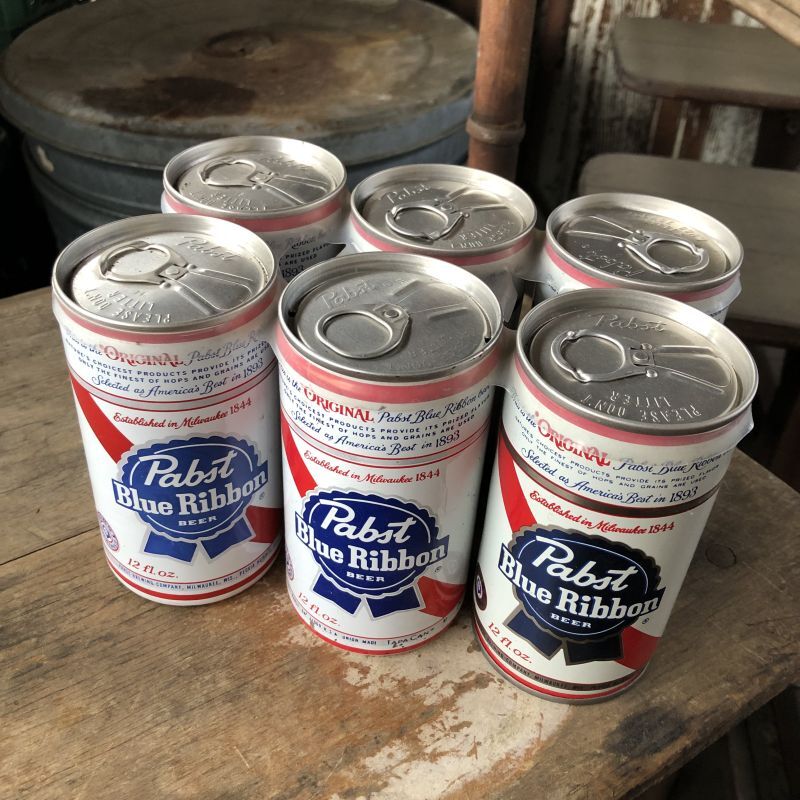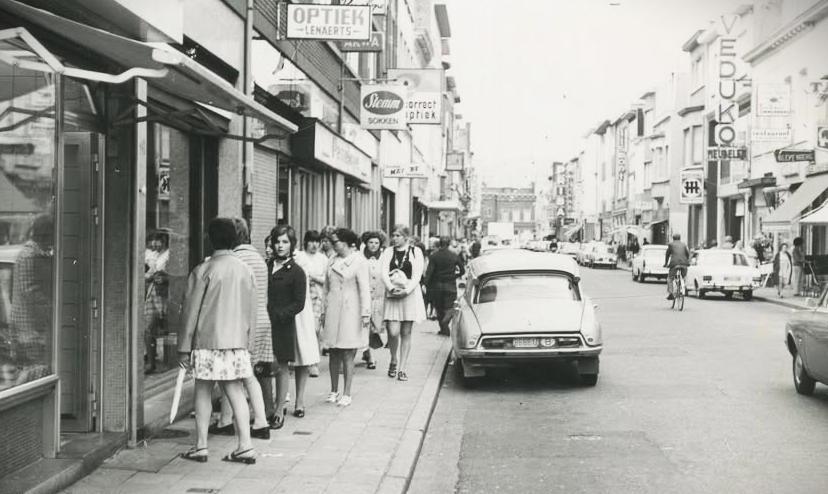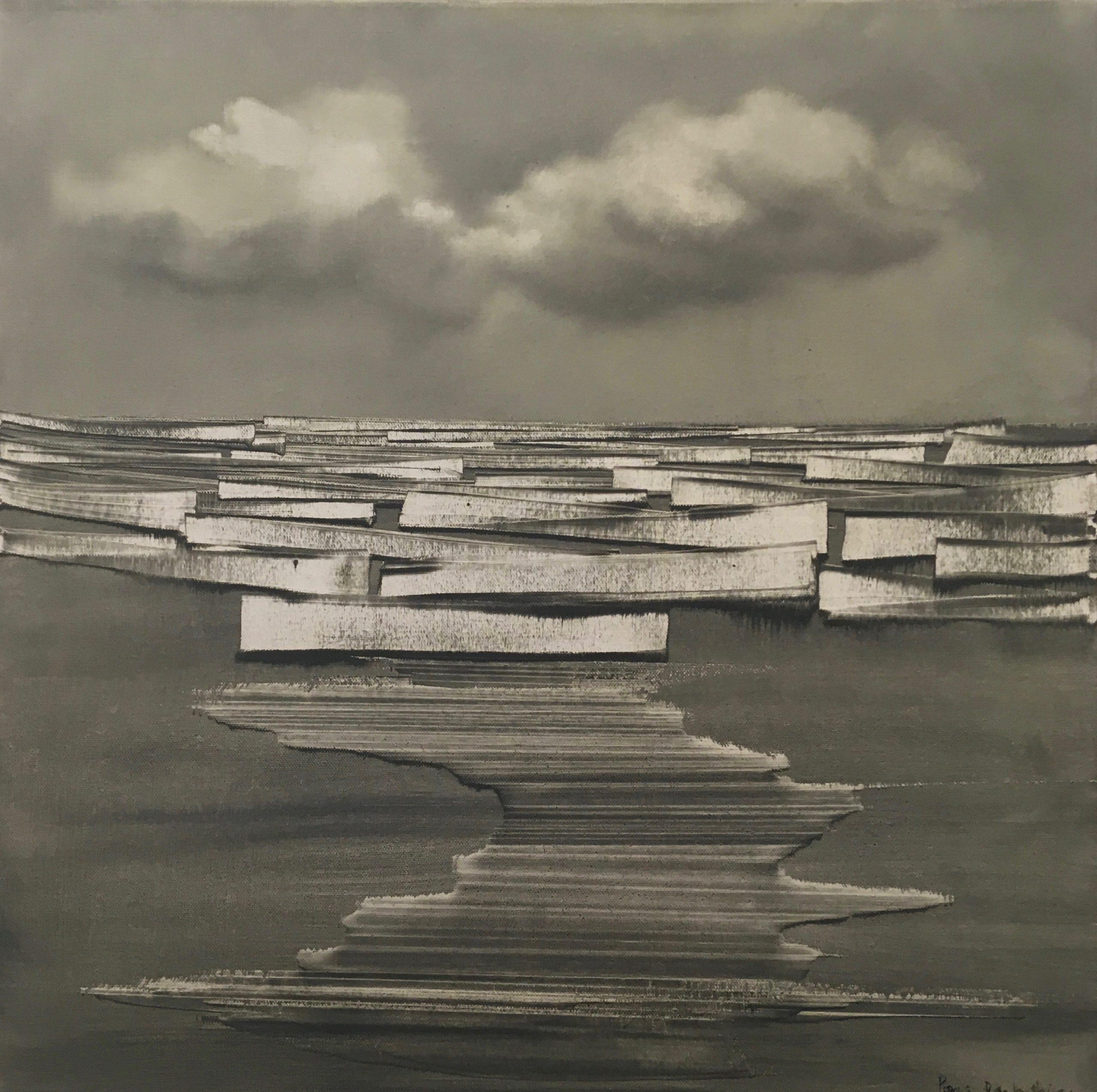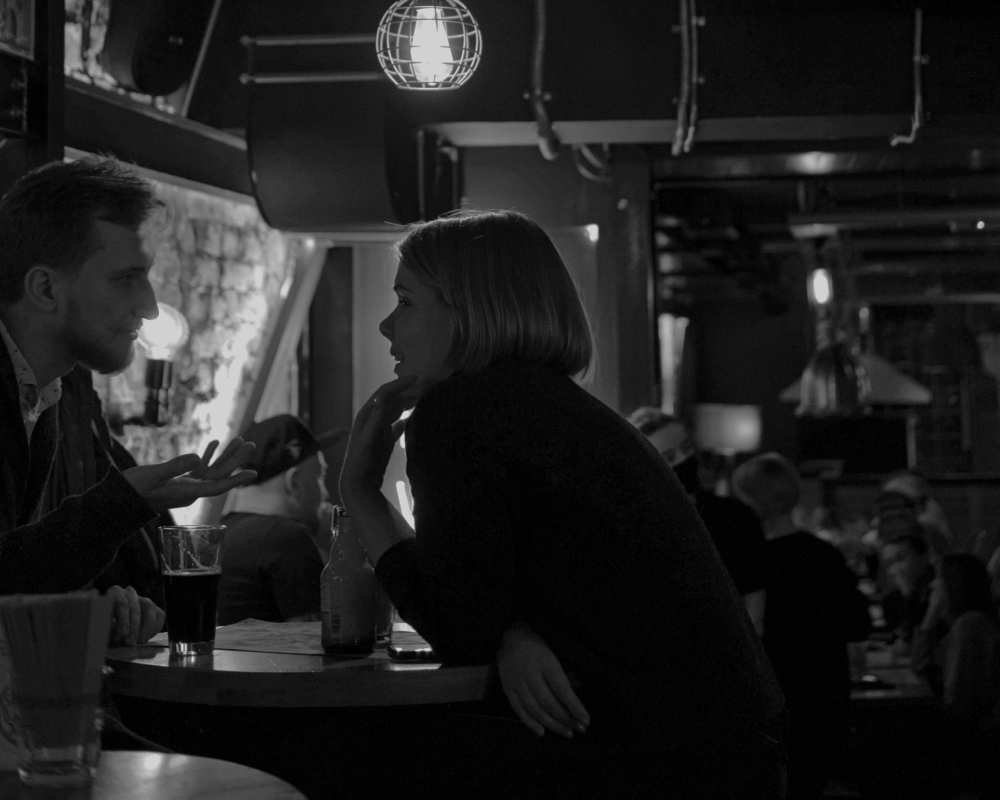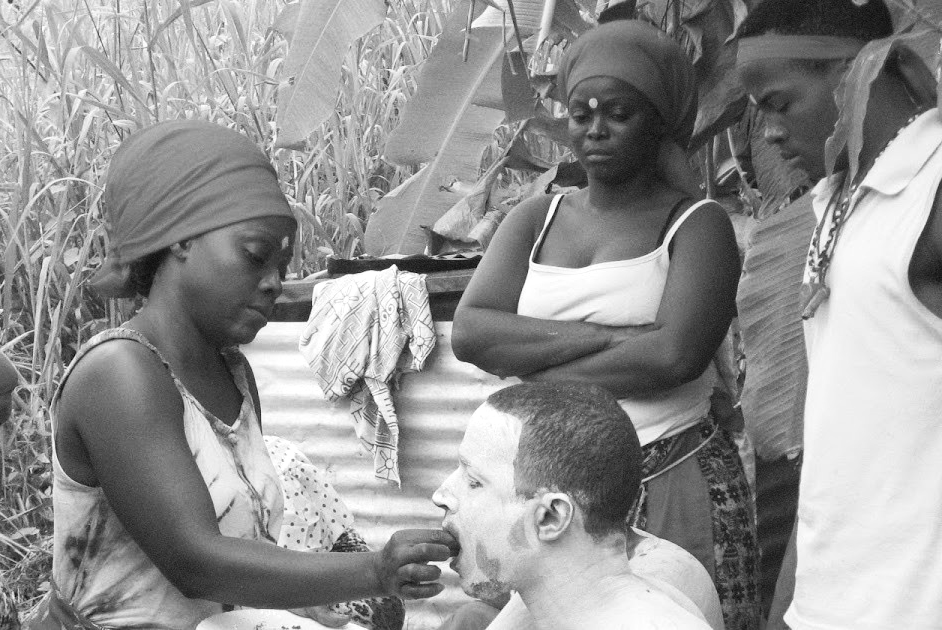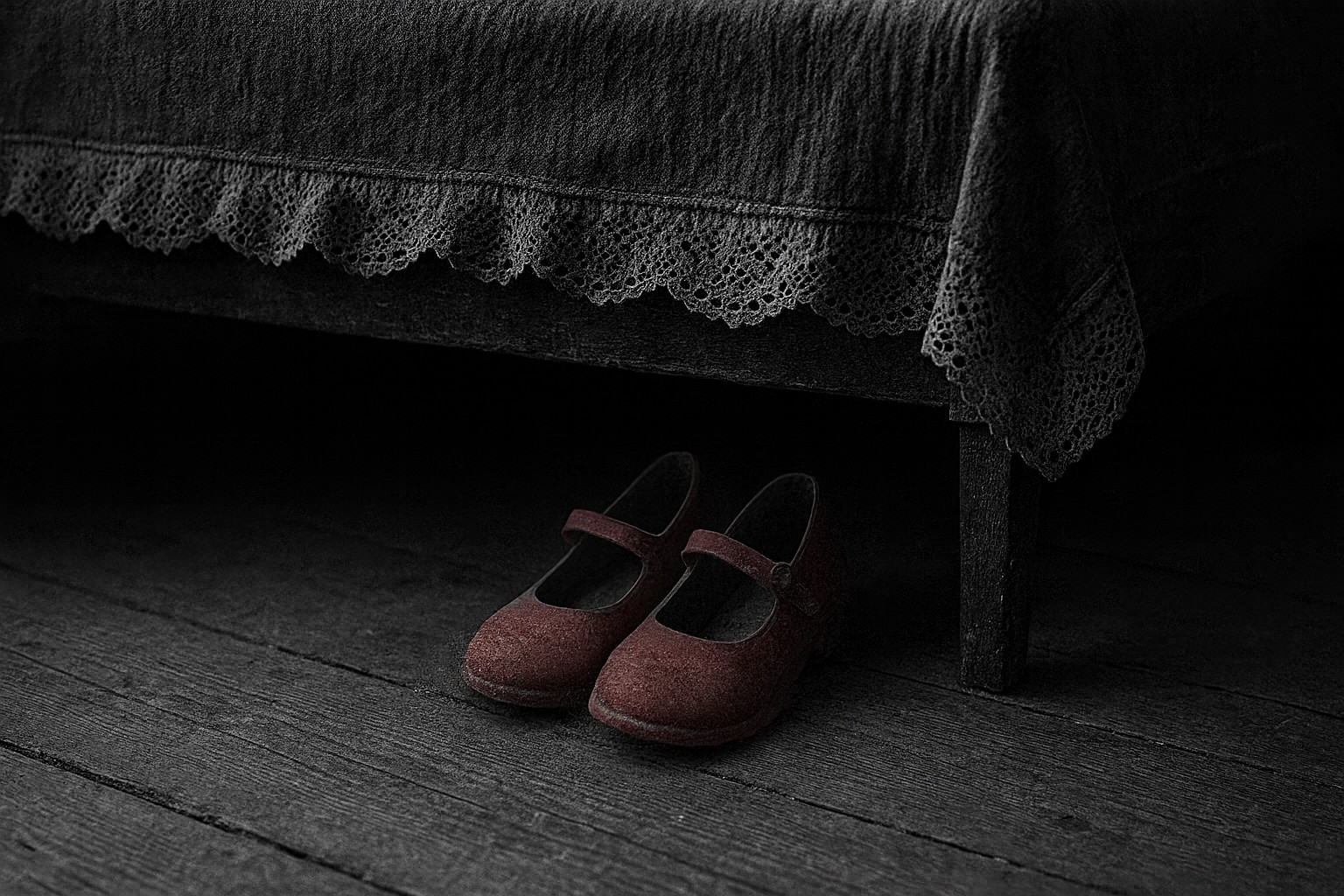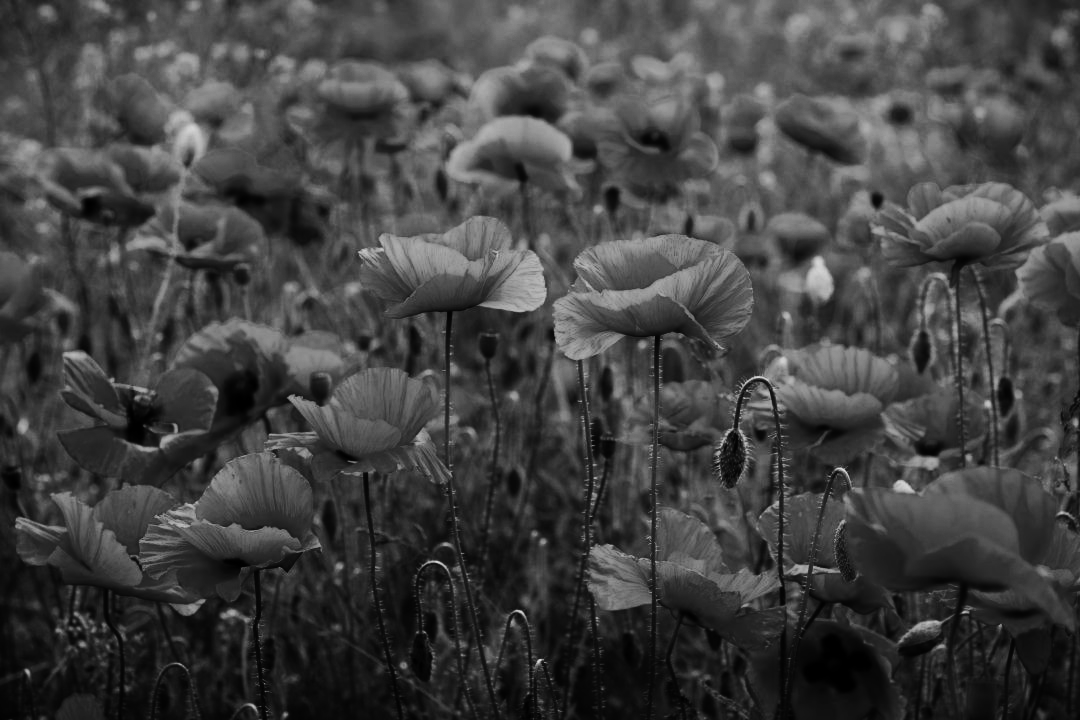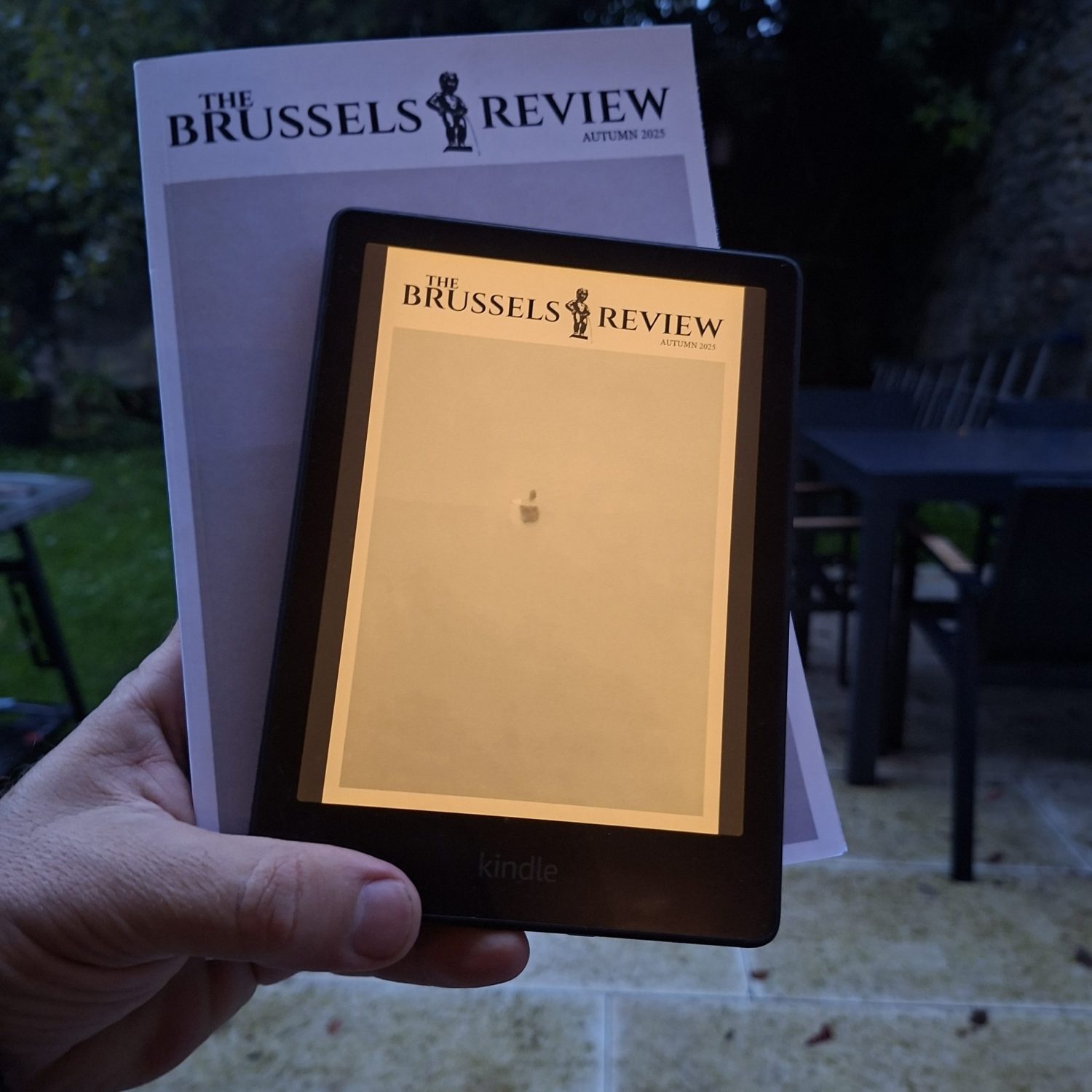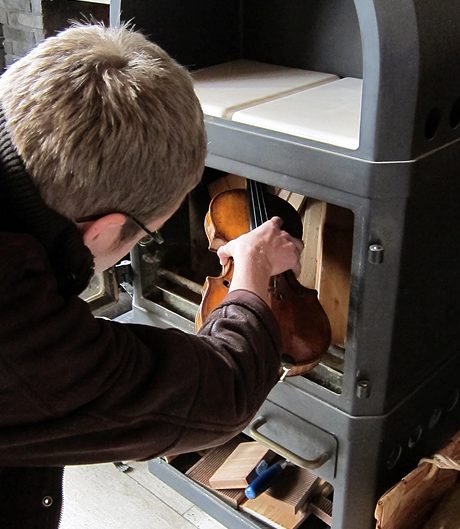I wasn’t even in nursery school when I discerned that my mother’s husband, John, was not my father. At factory functions, John would introduce our motley family to his friends by noting “This is my wife Sandy. This is my baby boy, Joey and that’s my wife’s kid, Chrissy.” He’d make this announcement, with early-morning beer breath, while running his calloused and oil-stained hand over Joey’s impossibly blond baby hair. And when John fought with Mom in front of us, which was frequent in the evenings after dinner, he would refer to me as “Bob’s bastard.” While I didn’t know what a bastard was, I instinctively recoiled knowing it was not a fulsome thing to be. I also observed that when baby Joey wanted a glass of milk, he would call out to John as “dada.” I just called him John when I needed something. While John was tender and affectionate with Joey, John treated Bruin, our family mutt, with greater care and fondness than he did me.
Once, after one of these tendentious family introductions at John’s annual General Electric tool and dye floor picnic, I asked mom a question that would haunt our relationship forever, “Why don’t I have a dad?” Mom did not miss an age-inappropriate opportunity to explain to her six-year-old daughter the sordid reality of her paternity. Mom, despite wearing her fancy dress and high heels, stooped down to my eye level, grabbed me by the shoulders and said “Chrissy, three teenaged boys made a bet to get your mom in the sack. And your dad won. Then he ran off to Nam. That’s your dad, Bob.” Then she stood up, straightened her dress, adjusted her broad-brimmed hat and smiled lovingly down towards me. She said all of this quite nonchalantly as she might have recited the items on her shopping list.
While she did not intend to, she sowed a seed of hope: somewhere there is a man named Bob who must love me as John loves Joey. With childish determination, I resolved that I would find him someday, somehow. As I grew older and understood the meanings of bastard,” “in the sack,” and the infamous “Nam,” I was also learning to read the phonebooks that arrived at our home to look for Bob. But there were so many, many Bobs.
* * *
Mom repeated the story with ever more detail whenever I became truculent about my abusive and unloving stepfather or with my own mother who failed to protect me from a growing number of abusive men in our family. I began to insist defiantly that if my dad knew how unloved I was, he would surely come and rescue me. Mother was stone-cold adamant that he absolutely would not.
When I was eleven and got my period, Mom repeated the story of the bet as a cautionary tale against my getting pregnant. Sitting beside me on my bed, she expanded upon the story of the bet. She said pointedly, “Chrissy when I got pregnant with you, I had to run away to Tempe Arizona and shack up with your Aunt Carol. That’s why your first name is Carol. She made me do it on the count that I was living with her.”
Aunt Carol and her husband Art were the most glamorous persons I knew in the world. They wore matching jeans, flannel shirts, and Dingo boots and disported on motorcycles. So, when Mom, sitting next to me on my bed, showed me pictures of the trailer where she lived with Aunt Carol, I gushed in pride that I lived there. It was pink and it matched her large, pink car parked outside. I could not imagine anything as opulent as a matching car and trailer and I wondered if one day I could live like that.
Mom assured me that staying with Aunt Carol in her dazzling trailer was no vacation. As she told it, Mom fled there because she feared my grandfather’s wrath. Mother impressed upon me how dangerous it was to get knocked up out of wedlock in 1967 Rome City, Indiana. She explained, “Chrissy, you need to be careful otherwise you’ll end up like me.” My youth was not an impediment to appreciating just how much I never wanted to end up like her. Mom furthered that upon receiving her father’s assurances that he would not hurt her, she returned to Indiana with me. The assurances were empty. Once she arrived back in Rome City, my grandfather summoned her and Bob to the house. Grandfather reportedly thundered at Bob, while pointing a shotgun at the hapless man, “My first grandkid won’t be no goddamned bastard!”
Mom told me this story about Bob in hopes of squashing my fledgling belief that Bob would care about me. She reminded me that he volunteered three times to go to Vietnam to avoid being her husband and my dad. “He doesn’t give a shit about you, Chrissy,” she declared with vindictive certitude. “And he never will.”
One day I was in my bedroom reading on my bed when Mom came in. She seemed tired after a long day of unloading semis at Ayre-Aye. Mom sat down on my bed and explained that when Bob returned from Nam, she divorced him then married John. In her usual matter-of-fact way, she told me that “John hated Bob and that’s why John hates you.” Despite my tender age, I understood the moving parts of the story thanks to Judy Blume. But by now I had my own questions and now seemed like the right time to fire away. “Mom, why does John hate Bob and who were the other two men in the bet?” Mom told me without an iota of shame that the other two were John and his brother, Uncle Mike. This was why John hated Bob. Bob won the bet. This outcome stung John because he had loved my mother in those days.
I stood up from the bed, put my hands of my hips defiantly and yelled at her, “Mom how the hell could you marry another man who made that bet?” My face was hot with rage. I was unable to understand what struck me as terrible decision-making even at that age, perched on the cusp of childhood and young womanhood. Mom told me bluntly “I had to, Chrissy. I was pregnant with Joey. I married John letting him believe he was Joey’s father.” The words letting him believe was a sucker punch. There it was. Joey was no more John’s son than I was his daughter. I ran outside to the backyard, found my cat, Smokie, and sobbed hard into his fur until darkness settled in.
Mom would rehearse this secret which became a heavy burden upon my young shoulders. The fact that I could be entrusted with this ominous secret made me feel important, almost as if I were her confidante. But this revelation gutted my relationship with my brother. I was jealous of Joey who could never be my ally in this dangerous home. He was my competition fighting for scraps of love and safety in a household in which I was at the lowest rung. I was tempted daily to burst out at John when he was cruel to me “Joey isn’t your son any more than I am your daughter.” Somehow, I managed to resist the urges of childhood’s brutality. I kept the secret although it burned in my chest and when I cried—which was often—I cried alone. There was no one to console me except a figment of an imaginary father named Bob.
Mom’s violence was extensive. It was verbal and physical. She called me bitch so often that my youngest cousin thought that was my name. Mom was horrified when, at the doctor’s office, cousin Sandy toddled towards me, all the while calling out “Beech! Beech!” I was eight years old. And while her tongue stung, so did her beatings. Upon crimes real or imagined, mom would sink her nails into my girlish arms and whoop me with whatever she could find, and she would beat me until she was exhausted. I rarely understood why I was being beaten. But I learned to read her body as it hurtled at me like a rageful cyclone. I also knew that there was nothing I could do to appease it. I learned to fear her more than I could love her. And in moments like this, I imagined my father’s righteous indignation if he only knew that his only daughter was suffering like this. I imagined him swooping me up, comforting me, and leading me to his own halcyon home.
During my teenaged years, my relationship with Mom became evermore strained as pubescent hormones and my own rage at John, whose abuse she ignored became a field of unexploded ordinance. We fought physically. She’d try to beat me, and I’d try to escape her pounding fists and flailing kicks. What I lacked in physical strength at that age, I made up with my words. I was learning the power of words and how I could land my own verbal punches in places where they would count.
On my thirteenth birthday, Mom gifted me yet another reason to seethe: Rick. “Chrissy, if I don’t leave John I’m going to kill him,” Mom proffered effortlessly while sitting in her knock-off Barcalounger in her red flannel nightgown, sucking her thumb. She always sucked her thumb to self-sooth. “But” she continued, “I can’t survive on my minimum wage at Ayre-Way.” So, Mom began to date behind John’s back in quest of a replacement meal ticket. Afraid of getting caught and courting John’s violent ire, I would be her alibi on these romantic misadventures. I’d wait in her red Pinto in the cold October and November Indiana nights as Mom prowled the Picker, a popular Ft. Wayne Honky-tonk. There she would meet hapless men and evaluate them as potential husbands. She would bring the special catches to the car where they made small talk and made out while I pretended to sleep in the back. The car was only warm when they were in it and running the engine.
One of those men from the Picker was Rick. He knocked her up soon after meeting her. That was how Mom purloined Husband Number Three. Rick was less violent than John. Mom tried to upsell him to Joey and me. One November Saturday morning, she breathlessly declared, “Rick is going to be your new dad. You’ll be pleased to know that he lives in the nice trailer park on I-69…you know…the one with the pool!” Joey and I bought this canard until we learned that while he did live in a trailer park, it was not that trailer park. And it most certainly had no pool. She divorced John and married Rick. We moved from one man’s home to another’s by January. I vowed that I would never live like this and that I would somehow find my own mercurial father, Bob, who, I insisted to myself, would be outraged if he knew of my mother’s shenanigans.
But I needed more information about Bob. While making the hour-long drive to grandmother’s house one wintery Sunday morning, I asked, “Mom, when Bob, John and Mike made that bet to get you in the sack, what did they bet?” Mom took a sip of her Tab and declared with certitude, “Chrissy, it was 75 dollars. Your dad got 75 dollars for ruining our life and the goddamned bastard has never paid a single dime in child support.” I understood that 75 dollars was a lot of money then in 1983. So, it sure as hell was a handsome sum in 1968. Would any of these hillbilly teenage miscreants even have 75 dollars to wager? A seed of doubt was sown.
Following up on this doubt, I pried my birth certificate from my mother’s dresser drawer and did the math. Looking at the parental birth dates on my birth certificate, I calculated that Mom was twenty when I was conceived but Bob was seventeen. I felt a hollow in my gut and my legs wobbled. How could she be the victim? When mom and I had a particularly heated fight sometime later over Rick’s petty authoritarianism, I decided that I no longer believed this bet nonsense and I told my mom this flatly. In fact, I stopped believing anything she said, big or small. Even as she, drunk on indignant rage, sunk her nails deep into my upper left arm, I hissed “I do not believe my father is such a prick.” I could not believe this for no other reason than my own survival.
* * *
When I turned fourteen, I could not live with the anger that lived inside me like a furious tiger always rearing up to attack. I first wanted to die when I was eight. Now, suicidal thoughts were like my shadow: sometimes long, sometimes stout but nearly always there. I could find no reason for my existence. My last recourse was god. I began going to Calvary Temple, a holy roller church where people spoke in tongues and spoke of prophecy. Pastor Paino’s sermons helped me make sense out of my chaos- and abuse-filled life. After all, no one had it worse than kids in the Bible. Especially Jesus. His own dad had him brutally murdered. My churchgoing self could not abide by Mom’s outrageous choices. From my newly focused judgmental eye, she seemed to have a predilection for getting pregnant then married; pregnant, then divorced, then married; then again pregnant, divorced, and married. And with each cycle, the men she married seemed to be no better than last. Church did not teach me to have compassion for Mom; rather, it taught me that she was going to hell. This was exactly where I believed she should go along with her petting zoo of shitty husbands.
One July day, in a hormone-fueled fit of Biblically informed rage at Rick’s never-ending shitty behavior and her tolerance of it, I yelled at her. “Mom, Pastor Paino says you’re a goddamned jezebel and you’re going straight to hell.” I was still only fourteen, but my rage was righteous and dripping in Sunday school wisdom. My bones craved stability and safety. I wanted a father—my father. I now understood that my stepfathers treated me like refuse because I was evidence that other men had touched Mom before they had.
I knew I would get my comeuppance. Mom slapped me hard, but I raged back, “I am tired of hearing about the goddamned bet. I just don’t believe that three poor hillbilly boys would make such a bet to have sex with you for seventy-five dollars that they didn’t even have.”
Mom’s hand coiled up into fists and beat me and, as she did, I tearfully hollered, “You should ask Jesus to forgive you.”
Mother was livid. The slaps and punches came hard and fast. “You little bitch, you should be grateful that I didn’t put you up for adoption.”
It wasn’t the first time she said this to me, but I vowed it would be the last. “I am not grateful. You should’ve put me up for adoption. Maybe I would be loved,” I shrieked uncontrollably as tears streamed down my flushed cheeks. I envisioned that in 1968, the couple that adopted me would’ve loved me, cared for me, and provided me with stability. This was preferable to the corral of perpetrators that my mother maintained.
Before my mom could grab and whoop on me more, I bolted out of the house and into the forest behind our home. I hid for hours contemplating where I could go or who I could call for help. Despairing of options, before nightfall I snuck over to Big Red’s house. Big Red, named after her wild main of unkempt fire-red hair, was a churchy Missionary Baptist neighbor with whom I had previously sought Biblical solace. “Big Red, mom is going to kill me. Can I please stay here for a while. Please?” Big Red, who was also a mother, looked at me with sincere concern. “Chrissy, when did you leave the house.” “Hours ago. What does it matter?” Big Red patiently explained, “Chrissy, you know your mom must be worried.” She then picked up the phone and did the needful. Within minutes, I looked out of Big Red’s kitchen window in terror as I saw Mom charging up the sidewalk like a banshee. Mom stormed into the kitchen, grabbed me by my arm and hauled my ass home with that same terrifying verve.
When we reached home, she screamed in unbridled Rage, “How dare you embarrass me in front of my girlfriend.” I snapped back “You should be embarrassed,” then stormed off to my room in righteous teenage indignation. Mom did not follow me or attempt to scold me. I sobbed into my pillow until I fell asleep. In the morning, Mom and I walked past each other, pretending that everything was the same. But we both knew something fundamental had shifted. We were no longer on the same ground. Indeed, after that argument, my mother rarely mentioned the bet again. She floated it once when I was in college, but my Olympian eyeroll made it clear that I wasn’t in the mood to hear what I clearly believed to be a load of horse shit offered up instead of taking personal responsibility for making really appalling decisions.
My desire to find Bob became a desperation. I could not forgive my mother for the trauma-drenched life she gave me. I could not make peace with the fact that under her watch, stepfathers and uncles took turns extinguishing my girlhood and planting seeds of rage that grew into mighty trees whose branches now reached and scratched the cerulean sky. Life waged war on me so I waged war back. But I couldn’t shake the belief that if Bob only knew about any of this, he would rescue me. He would comfort me. He would provide a safe place for me to live. He would hold me and tell me that I never deserved any of this. When life was roughest, my imaginary father became ever more protective and caring. Bob—or the idea of Bob—was my refuge. Because he had to be.
* * *
In September 1993, my mother died from metastatic melanoma. She was forty-five. I was twenty-four, scarcely two years out of college and living in Chicago which is where I went to escape Indiana. Throughout my childhood I had been a diligent student. The tougher things got, the more I studied. Various teachers advised me that I would only escape that shithole through my studies. I embraced their guidance with dead seriousness. I graduated from my peri-rural high school as the valedictorian and went to the University of Chicago on scholarships and financial aid. Life at Chicago was very difficult. Many of my classmates went to elite high schools. I lacked their preparedness and had to work much harder than my peers. The University of Chicago was a cruel and unforgiving place for students whose lives were challenging. I was always an outsider in this elite fraternity. I could never afford to go to restaurants with the few friends I had. I never felt that I could take a break from studying as I knew even then this was a process not a destination. When I wasn’t studying I was working in the lab to advance my aspirations of becoming a scientist and increasing my odds of getting accepted into a doctoral program. I felt a jealous contempt for what I perceived as the pampered lives my classmates seemed to enjoy taking spring breaks to Mexico and summer stays in Europe. My contumeliousness only made me more isolated, less able to forge connections and ultimately evermore alone in my misery.
Mom died a week before the beginning of my doctoral program, which was also at the University of Chicago. I chose to stay at Chicago to be close to her given the death sentence that melanoma was in 1993. The few friends I had shrunk in fear from me. None of them could countenance losing a mother this young. They treated me as if “dying mom” was a contagion. What’s worse is that mom denied me in life she denied me death. Even on her deathbed after I begged her forgiveness for any intransigence great and small, she could not afford me the decency of an apology for her myriad failures which robbed me of the self I could’ve—no, should’ve—been.
As I stood in the rain by her grave watching the undertakers lower her pale blue coffin into the moistened ground fragrant of petrichor, I wondered whether I could have been less hard to love had mom been different. Could’ve I have been less angry at the world? How different would I be if that couple in Arizona had raised me?
Shortly after her death, I met a man and fell in love for the first time. We met in O’Hare airport where I shamelessly picked him up on a flight to San Francisco where we both traveling for the week. Gurmit was a doctor from London. He was doing his residency in Chicago to learn how to treat gunshot wounds as there are too few in London to study. He was a Sikh with gentle eyes. He wore a pale blue turban and uncut beard. Both of us had lost our mothers recently. When we met in San Francisco, he told me about his narrow-minded, old-fashioned father and I shared with him my questions about my own absentee father. Our sense of loss drew us together.
One day in April of 1994, denervated by Gurmit’s support, I mustered the courage to write Bob. I obtained his address from a chance meeting with a relative in a Kendallville strip mall when mom was still alive. “Bob,” I nervously wrote, “mom died from cancer in September. Perhaps now we have a chance to get to know each other?” The letter was very brief and said little more than this. I mailed it with few expectations. He had rejected me my entire life. I did not expect that mom’s death would kindle some fatherly urge in the same man who preferred Nam to my paternity. But nonetheless, I was hopeful that against the odds some spark would ignite a desire to see the daughter he long ago abandoned. If not out of some sense of misplaced sense of affection, then perhaps out of curiosity.
To my surprise, Bob wrote back seemingly immediately. Within a week, his responding letter arrived. I don’t recall what—if any—other mail arrived that day because none of it in hindsight mattered. I only remember laying eyes on the envelope with his left-slanted writing. I opened it fearfully. The letter wasn’t inviting or even thoughtful. It began crudely, “Chrissy, I don’t feel the need to gather up my flock.” The sentence was jarring because it implied there was a flock of deserted kids who needed gathering up. It turns however out that I was a flock of one. He proceeded to explain, “You need to understand your mom was a violent, crazy bitch. I couldn’t see you if it meant seeing her.” The letter was festooned with expletives for my mom which was hard to read given her recent demise. But, in fairness, many of these invectives did not sound totally out of line. I used some of them myself. I had seen her frenzied wrath countless times. I was not without sympathy for Bob’s account or predicament.
Amidst his myriad recriminations against her in this first letter, he confirmed one important fact: he was seventeen when I was conceived. Somehow, I felt empathy for him being a dad at seventeen. No doubt, it was hard as hell being a single mom at twenty-one in rural Indiana in 1968. But, I had spent my life feeling pity for my mom and somehow seventeen just seemed worse. He was barely able to drive a car much less be a dad or…go to Nam when he made me. So, I decided to hold his truth and her truth equal in value and I tried not to reconcile them. I could and would keep their truths compartmentalized.
I managed to muster the courage to write to him again. I had hoped that after his first epistolic catharsis, he could move towards the possibility of meeting. But each letter I received in return was full of vitriol and it seemed that a complete expiation of his rage and outrage alike was impossible. I had all but written off the Bob Project when out of the blue one May Friday night, Bob called. Charily he said, “Chrissy, I think we can meet.”
Despite his lack of enthusiasm and my own wariness, we set the time and day in early June. I was incredibly anxious and worried about being rejected. Nothing in his letters much less his phone call suggested great enthusiasm for meeting me much less plodding a path that would allow us to form a relationship over time. As a motherless child, I was anxious for a parental relationship to buffer the brutalities of living life on my own so young. Graciously, Gurmit flew into town from London for the dubious occasion. We rented a car and made the two-and-a-half-hour journey from Chicago to Bob’s home in Elkhart, Indiana. During the drive, Gurmit sought to distract me with small talk. At times, my hands shook, my voice quivered, and my stomach cramped. The stakes felt so high. By 11 a.m., I was maneuvering the car into his gravel driveway. My heart was leaping out of my chest. I found it hard to breathe. Gurmit explained that I was having a panic attack and talked me through it. Gurmit put his hand on my thigh and calmed my nerves. “It’s going to be fine, Chris,” Gurmit said measuredly. I hate to admit this, but Gurmit’s calming accent made everything feel easier, better.
Bob’s home was a mustard-yellow, modest, post-World War Two era house that was never supposed to be permanent. Nonetheless it was well cared for. There were weeping willow trees in his attentively manicured lawn. The garage door was open revealing an astonishingly well-organized garage. We climbed out of the car, met on my side, and walked together towards the concrete slab that passed for the porch. It was hot and muggy. My sweaty bangs matted to my forehead. I rang the bell. Bob opened the door and peered around it circumspectly.
He wore an immaculate white t-shirt and baggy, faded jeans that struggled to hang onto his rangy hips. He was tall and gangly with white hair and sharp widow’s peaks. He had a can of Pabst Blue Ribbon beer in his hand. I noticed that his hands were impeccably clean. There was no mistake. I was this man’s daughter. I had his clear-blue eyes, large and bulbous nose, and short forehead. Fuck. I had his whole damned face. Even his widow’s peaks. Suddenly I recalled my mother yelling at me whenever she was mad at me, “You look just like your goddamned father.” Now her enraged declaration made sense. I do look like my goddamned father.
Bob looked at Gurmit and grimaced. Bob bellowed, looking at Gurmit, “What the hell is that?” I quickly acted to protect Gurmit from his racist onslaught. “Bob, I’m Chris and this is Gurmit. He’s my fiancé. He’s a doctor in London.” Bob offered several more racist comments that illuminated the social, cultural, and intellectual gap that yawned between us. I pushed back, “Bob if you’re going to continue with this racist tirade, I’m—we’re—leaving.” Bob relented.
Then, Bob stepped out in front of the door and broke the silence that followed his hateful harangue. “Chrissy. You need to know one thing,” Bob paused before continuing, “You weren’t born out of love. You were born on a bet. A bet over a PBR six pack.”
I can’t recall what else he said if he even said anything else at all. The ground swirled beneath my feat. My face flushed with shame and self-loathing. I thought I would faint. There were no handrails. I reached for Gurmit to steady myself. Gurmit grabbed me by my waist and steadied me.
Then, in horror, I backed off from the porch and went straight to the car. Gurmit followed closely behind. We drove in silence until we reached home. I hated myself. I couldn’t even comfort Gurmit for the racism he just suffered. Because, standing upon that naked, concrete slab I learned a ribald truth: perhaps the only truthful thing mom ever said about my dad turned out to be true. Except it wasn’t 75 dollars: it was a six pack of Pabst Blue Ribbon beer. Our lives were shaped over a wager of one of the shittiest beers on the market. Even on her death bed, I not only rubbished this foundational truth but despised her for insisting upon it.
I’m fifty-six now. I’m much older than she was when she passed. I still have nightmares about her and the bet and my ludicrous childhood belief in a benevolent Bob who was capable of rescuing me and caring for me. The dreams come in different variations, but the theme is the same. I’m trying to find her. I’m trying to tell her that I believe her. That I now know she told the truth. But in my dream, she’s always unavailable, absent, and elusive. And I can never offload this heavy shame in my dreams any more than I can in my waking hours.

